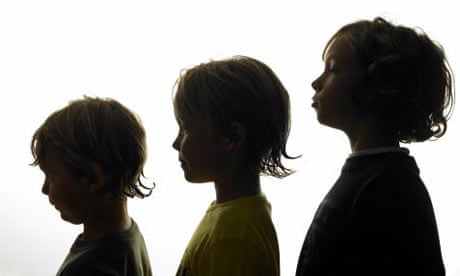The idea that the person we become is partly defined by the order in which we come in our family was first proposed by Austrian psychiatrist Alfred Adler. Adler believed that sibling hierarchy has a profound effect on our personalities, and can influence everything from the career choices we make to the people we fall in love with.
Studies suggest that the differences between oldest, middle and youngest siblings have more to do with nurture than nature. Oldest children often have higher IQs, but this isn't necessarily because they are genetically more intelligent. It's more likely that they will have had both more input from their parents, and taken on the role of teacher for their younger siblings, thus strengthening their own knowledge.
Although Adler's theories have been challenged over the years, there are certain characteristics and life choices that seem remarkably consistent in oldest, middle, youngest and only children.
Oldest children
Typically responsible, confident and conscientious, they are more likely to mirror their parents' beliefs and attitudes, and often choose to spend more time with adults. Oldest children are often natural leaders, and their role at work may reflect this.
Because they are more likely to have authority over younger siblings, or take on the role of surrogate parent, they have a tendency to be bossy and want things to be done their way. Oldest children can be perfectionists and worriers, and may put pressure on themselves to succeed.
Middle children
Likely to be adaptable, diplomatic and good at bringing people together, middle children are often popular and patient. However, because their role in the family changes from youngest to middle, it is thought that they often struggle to establish a clear role for themselves, and many go through a period of rebellion.
Middle children can be competitive: they do not have the time on their own with their parents that oldest children enjoy, and their role as the baby of the family is supplanted, so they have to find other ways of getting their parents' attention.
Youngest children
Charming, impulsive and good
at getting their own way, the youngest child's role as baby of the family means that he or she is likely to be indulged. This may mean fewer responsibilities and more opportunities for fun, but youngest children often find that they aren't taken as seriously or given the independence they crave. Youngest children often rebel as a way of distinguishing themselves from older brothers and sisters. They are more likely to take risks, and often choose a career that is different from other members of their family.
Only children
Only children enjoy the same parental attention as first-borns and are often confident, conscientious and socially mature, due to the amount of time they spend in a largely adult world. They may have a tendency to assume that others know how they are feeling, or think the same way as they do, without question. They may be dependent on their parents for longer than other children, spending more time at home and delaying decisions about their future.



